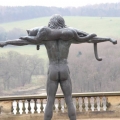12th Night
 chippy
<b style="color:pink;">Global Moderator</b>
chippy
<b style="color:pink;">Global Moderator</b>
Oxford English DictionaryThe evening of the fifth of January, preceding Twelfth Day, the eve of the Epiphany, formerly the last day of the Christmas festivities and observed as a time of merrymaking.
Why is Twelfth Night on the 5th January and not the 6th (Twelfth Day)?
It is only with our modern understanding of astronomy and time keeping that we start a new day in the middle of the night. To our ancient ancestors, the end of day was when the sun went down. The oncoming night was the beginning of the next day. Nights were actually part of the holiday i.e. part of the next day.
Christmas, started at sunset on 24 December. They considered this to be Christmas Evening (or Christmas Eve). Christmas would then continue until nightfall on the 25th which started St. Stephen's Day, (Boxing Day) the first of the twelve days of Christmas.
To our ancient ancestors, the Twelfth night after Christmas would have been the evening before 6 January, the twelfth and final day of the Christmas season.
The actual date for Twelfth Night has caused much confusion for years and still does today. This is because our modern understanding of the words 'eve' and 'night' mean something different to what our ancient ancestors considered them to be.
For us today the night or evening follows the day: Day-Night
To our ancient ancestors, it was the other way round: Night-Day
Twelfth Night is when all Christmas Decorations should be removed so as not to bring bad luck upon the home. If decorations are not removed on Twelfth Night, they should stay up all year.
Long ago it was thought that leaving the decorations up would cause a disaster. People believed that tree-spirits lived in the greenery (holy, ivy etc) they decorated their houses with. The greenery was brought into the house to provide a safe haven for the tree-spirits during the harsh midwinter days. Once this period was over it was necessary to return the greenery back outside to release the tree-spirits into the countryside once again. Failure to do this would mean that vegetation would not be able to start growing again (spring would not return), leading to an agricultural disaster.
It was also thought that, if you left the greenery in the house, the tree-spirits would cause mischief in the house until they were released. visit projectbritain.com for more information
Today people still feel uneasy about leaving the Christmas decorations up after Twelfth Night. Despite decorations now being made of foil or paper, and even though the tree-spirits are long forgotten, the superstition still survives.
In the UK, people used to have parties on Twelfth Night and it was traditional to play practical jokes on your friends and neighbours. These included tricks such as hiding live birds in an empty pie case, so that they flew away when your startled guests cut open the crusts (as in the nursery rhyme "Sing A Song of Sixpence" goes, "…the pie was opened and the birds began to sing".
Twelfth Night Cake
The Twelfth Night cake was a rich and dense fruitcake which traditionally contained a bean. If you got the bean then you were King or Queen of the Bean and everyone had to do what you told them to do.
There were also other items hidden in the cake:
If you got a clove you were a villain.
If you got a twig you were a fool.
If you got a rag you were a tarty girl.
Twelfth Night Plays
Twelfth Night itself was a traditional day for plays or "mumming" and it is thought that Shakespeare's play, Twelfth night, took its name from the fact that it was first performed as part of Twelfth Night celebrations about 1601.
The Yule Log
The Yule log, lit on Christmas day, remained burning until Twelfth Night in order to bring good fortune to the house for the coming year. Its charred remains were kept, both to kindle the next year's Yule log, as well as to protect the house from fire and lightning.
Traditional Foods
Traditional Twelfth Night foods served in England include anything spicy or hot, like ginger snaps and spiced ale.
A traditional Twelfth Night drink is a hot and spicy punch called wassail.
Twelth Night Celebrations Today
People in the UK still celebrate Twelfth Night today.
Many places throughout the UK carry out the Twelfth Night tradition called "Wassailing." On Twelfth Night a lot of people gather to drink to apple trees and to each others health.
Twelfth Night Celebration in London
Each year Twelfth Night is celebrated on London's bankside riverside. To announce the celebration, the Holly Man appears from the River Thames. Afterwards the traditional St. George play is performed. At the end of the play Twelfth Night Cakes are distributed. Those who find the hidden bean or pea are crowned King and Queen for the day.
The Holly Man from the Thames
To herald the celebration, the extraordinary Holly Man, the winter guise of the Green Man, (a character from pagan myths and folklore, used on many pub signs in England), decked in fantastic green garb and evergreen foliage, appears from the River Thames brought by the Thames Cutter.

The Bankside Wassails
With the crowd, led by the Bankside Mummers, the Holly Man 'brings in the green' and toasts or 'Wassail' the people, the River Thames and the Globe (an old tradition to encourage good growth) with the London Town Crier.

Information from projectbritain.com
Comments